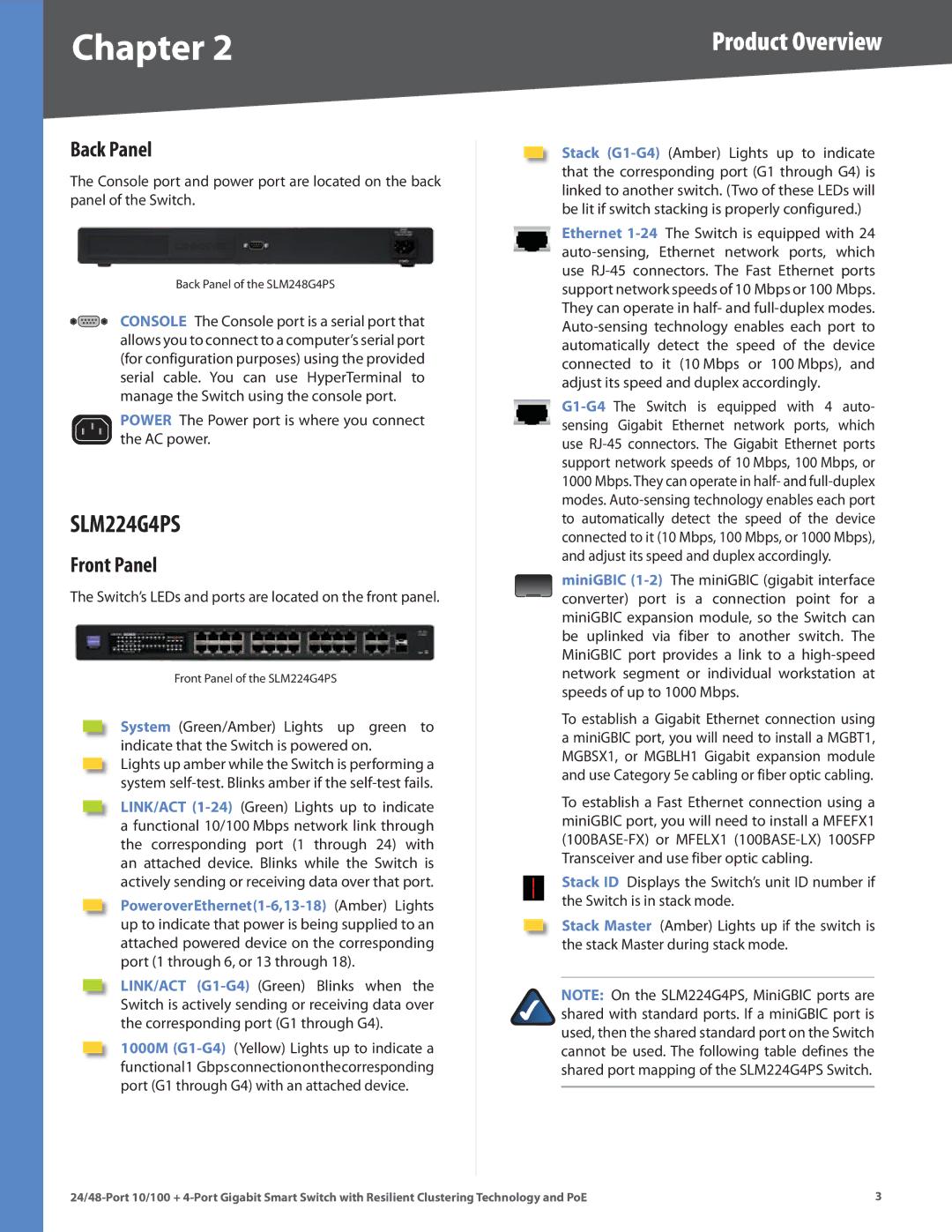Chapter 2
Back Panel
The Console port and power port are located on the back panel of the Switch.
Back Panel of the SLM248G4PS
CONSOLE The Console port is a serial port that allows you to connect to a computer’s serial port (for configuration purposes) using the provided serial cable. You can use HyperTerminal to manage the Switch using the console port.
POWER The Power port is where you connect the AC power.
SLM224G4PS
Front Panel
The Switch’s LEDs and ports are located on the front panel.
Front Panel of the SLM224G4PS
System (Green/Amber) Lights up green to indicate that the Switch is powered on.
Lights up amber while the Switch is performing a system self-test. Blinks amber if the self-test fails.
LINK/ACT (1-24) (Green) Lights up to indicate a functional 10/100 Mbps network link through the corresponding port (1 through 24) with an attached device. Blinks while the Switch is actively sending or receiving data over that port.
PoweroverEthernet(1-6,13-18) (Amber) Lights up to indicate that power is being supplied to an attached powered device on the corresponding port (1 through 6, or 13 through 18).
LINK/ACT (G1-G4) (Green) Blinks when the Switch is actively sending or receiving data over the corresponding port (G1 through G4).
1000M (G1-G4) (Yellow) Lights up to indicate a functional1 Gbpsconnectiononthecorresponding port (G1 through G4) with an attached device.
Product Overview
Stack (G1-G4) (Amber) Lights up to indicate that the corresponding port (G1 through G4) is linked to another switch. (Two of these LEDs will be lit if switch stacking is properly configured.)
Ethernet 1-24 The Switch is equipped with 24 auto-sensing, Ethernet network ports, which use RJ-45 connectors. The Fast Ethernet ports support network speeds of 10 Mbps or 100 Mbps. They can operate in half- and full-duplex modes. Auto-sensing technology enables each port to automatically detect the speed of the device connected to it (10 Mbps or 100 Mbps), and adjust its speed and duplex accordingly.
G1-G4 The Switch is equipped with 4 auto- sensing Gigabit Ethernet network ports, which use RJ-45 connectors. The Gigabit Ethernet ports support network speeds of 10 Mbps, 100 Mbps, or 1000 Mbps. They can operate in half- and full-duplex modes. Auto-sensing technology enables each port to automatically detect the speed of the device connected to it (10 Mbps, 100 Mbps, or 1000 Mbps), and adjust its speed and duplex accordingly.
miniGBIC (1-2) The miniGBIC (gigabit interface converter) port is a connection point for a miniGBIC expansion module, so the Switch can be uplinked via fiber to another switch. The MiniGBIC port provides a link to a high-speed network segment or individual workstation at speeds of up to 1000 Mbps.
To establish a Gigabit Ethernet connection using a miniGBIC port, you will need to install a MGBT1, MGBSX1, or MGBLH1 Gigabit expansion module and use Category 5e cabling or fiber optic cabling.
To establish a Fast Ethernet connection using a miniGBIC port, you will need to install a MFEFX1 (100BASE-FX) or MFELX1 (100BASE-LX) 100SFP Transceiver and use fiber optic cabling.
Stack ID Displays the Switch’s unit ID number if the Switch is in stack mode.
Stack Master (Amber) Lights up if the switch is the stack Master during stack mode.
NOTE: On the SLM224G4PS, MiniGBIC ports are shared with standard ports. If a miniGBIC port is used, then the shared standard port on the Switch cannot be used. The following table defines the shared port mapping of the SLM224G4PS Switch.

